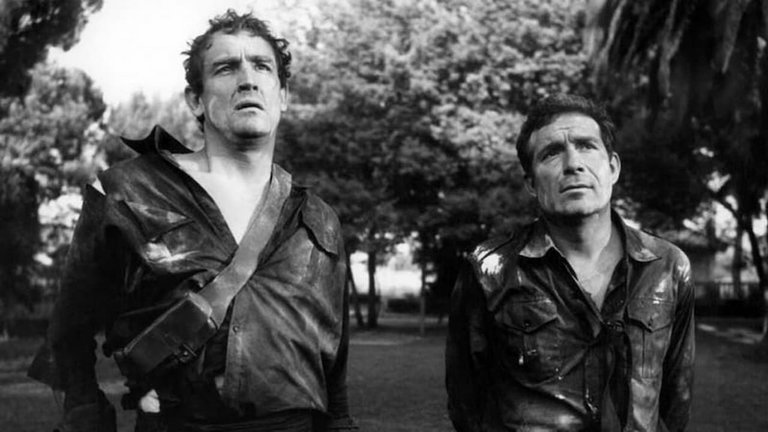
In the aftermath of World War II, Italy's relationship with its recent past, particularly its experience under Fascism, diverged significantly from that of Germany. While Germany grappled with the legacy of Nazism through a lens of guilt and accountability, Italy appeared more at ease in confronting its troubled history. This relative comfort can be attributed to several factors, including Italy's status as a victim of Fascism itself and the prominence of anti-Fascist figures within its society. Such dynamics enabled Italian filmmakers to explore the darker chapters of their national history with a certain levity. Dino Risi's March on Rome (1962) serves as a prime example of this trend, presenting a comedic yet poignant reflection on the rise of Fascism in Italy.
The film's title alludes to the pivotal event of October 1922, when Benito Mussolini and his National Fascist Party (PNF) orchestrated a mass march of the paramilitaries on Rome, compelling the Italian government to appoint Mussolini as prime minister. This marked Italy as the first nation to adopt Fascism as a governing ideology, setting a precedent that would resonate throughout Europe and beyond.
March on Rome begins few years earlier, in the immediate aftermath of World War I, a period when Italy emerged victorious yet economically drained. The government's failure to fulfil promises made during the war led to widespread discontent among peasants and workers, who expressed their grievances through protests and strikes. Influenced by the recent Bolshevik revolution in Russia, many sought inspiration from leftist ideologies. Concurrently, returning veterans found themselves struggling with unemployment and a loss of purpose, creating a fertile ground for radical movements.
Among these veterans is Domenico Rochetti, portrayed by Vittorio Gassman. In March 1919, Rochetti survives on Milan streets by conning wealthy passersbys into believing he is their former wartime subordinate. His fortunes change when he encounters Captain Paolinelli (played by Roger Hanin), his actual wartime superior and one of the leader in the nascent radical natioanlaist movement known as the Fascio di combattimenti. Rochetti is persuaded to join this organisation, which promises reform but also resorts to violence against its opponents. His journey leads him to reconnect with an old comrade, Umberto Gavazza (played by Ugo Tognazzi), who initially resists but eventually succumbs to the allure of Fascist promises.
The Fascists fail to win at the ballot box and instead try to win power through street violence. Their militia, known as the Blackshirts, is increasingly used as "muscle" by aristocracy and industrialists trying to suppress strikes and left-wing protests. During one such instance, Rochetti and Gavazza get involved in a street battle during which they accidentally injure a policeman and end up in prison. A few years later, they are set free by fellow Blackshirts and take part in the grand march towards Rome, during which they begin to wonder whether joining the fascists was a good idea.
Despite its serious subject matter, March on Rome is infused with humour characteristic of the commedia all’italiana genre that was gaining traction in Italian cinema at that time. Risi expertly balances comedy with historical gravity; the film opens with one global catastrophe—the Great War—and closes with another—the rise of a regime that would lead another major war. The humour often arises from the stark contrast between noble ideals and banal pragmatism. A good example is provided by the Fascists in their earliest days, adopting a political platform that is almost indistinguishable from left or liberal parties – abolition of monarchy, freedom of press, giving land to peasants, etc. However, by the end of the film, as Fascists increasingly depend on the support of the establishment, all those points are gradually erased from the Party's program. Rochetti must use all of his creativity to explain these discrepancies and betrayals to his naive friend.
The film's comedic success largely hinges on the dynamic between Gassman and Tognazzi. Their performances create an engaging "buddy" relationship that captures both the absurdity and tragedy of their situation.
However, March on Rome struggles in its latter half to maintain its comedic tone. As events unfold towards the film's climax, humour gives way to more serious themes that diminish its overall impact. Risi attempts to address this tonal shift through an epilogue where Rochetti and Gavazza, after abandoning Fascism, watch their former comrades parade triumphantly through Rome after abandoning Fascism and comment that the new regime won’t last.
The audience in 1962, when the film premiered, knew better than the protagonists; today's generations, not as well-versed in troubled 20th-century history, would likely miss the devastatingly ironic point of the last scene, and the same can be said of the film in its entirety. The audience with some familiarity with the subject would probably enjoy this flawed but brave and mostly satisfying attempt to address dark history in humorous terms.
RATING: 6/10 (++)
Blog in Croatian https://draxblog.com
Blog in English https://draxreview.wordpress.com/
InLeo blog https://inleo.io/@drax.leo
Hiveonboard: https://hiveonboard.com?ref=drax
InLeo: https://inleo.io/signup?referral=drax.leo
Rising Star game: https://www.risingstargame.com?referrer=drax
1Inch: https://1inch.exchange/#/r/0x83823d8CCB74F828148258BB4457642124b1328e
BTC donations: 1EWxiMiP6iiG9rger3NuUSd6HByaxQWafG
ETH donations: 0xB305F144323b99e6f8b1d66f5D7DE78B498C32A7
BCH donations: qpvxw0jax79lhmvlgcldkzpqanf03r9cjv8y6gtmk9